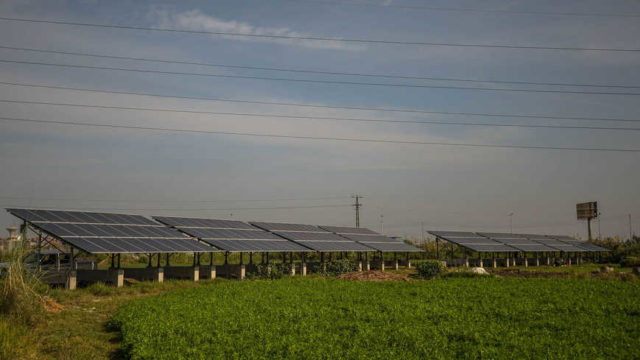Al-Monitor – Egyptian Minister of Water Resources and Irrigation Mohamed Abdel Ati said July 1 that Egypt is ready to provide all necessary means to link electricity with Ethiopia, and President Abdel Fattah al-Sisi has tasked Minister of Electricity Mohamed Shaker with this plan.
Abdel Ati said in a phone call with the DMC Channel that Egypt was ready to share future development projects with Ethiopia, on condition that Addis Ababa abide by the international commitments and law.
This proposition comes after the escalation of diplomatic tensions between Egypt and Ethiopia, culminating in an urgent session at the United Nations Security Council June 29, to discuss the resumption of negotiations over the Grand Ethiopian Renaissance Dam (GERD) and the filling process during drought and extended drought seasons.
The Egyptian Ministry of Irrigation and Water Resources announced July 3 the resumption of talks on the GERD among the ministers of water and irrigation of Sudan, Ethiopia and Egypt. But the Egyptian ministry said the virtual meeting held under the African Union sponsorship failed to yield an agreement on both technical and legal levels.
On Dec. 11, 2019, Sisi had said in a speech at the Aswan Forum for Sustainable Peace and Development that Egypt is ready to transfer 20% of its electrical power to African countries at low prices, reaching half the current price of $0.14 per kilowatt. Experts saw in Sisi’s speech a new step to compete with Ethiopia, which plans to generate and export electricity after the operation of the GERD.
Shaker had revealed in a speech at the International Forum on Power Interconnection — organized by the Global Energy Interconnection Development and Cooperation Organization — back in September 2017 that Egypt is planning on establishing power grids with five new European, African and Asian countries, namely Greece, Cyprus, Saudi Arabia, Ethiopia and Sudan.
Shaker noted at the time that there are ongoing studies on the establishment of power grids between Sudan and Ethiopia, as well as the Inga Dams in Congo. He said Egypt’s geographic location has made it the core of power linkage among African and Gulf countries, adding that his country is working on completing the power grid project between Egypt and Saudi Arabia.
On April 4, the Egyptian government announced the start of the operation of the power grid lines between Egypt and Sudan. It said that construction works ended in April 2019, and that the line is 100 kilometers (62 miles) long from the Egyptian side and 70 kilometers (43 miles) from the Sudanese side.
The government added in a statement that the first phase of operation aims at supplying electrical power reaching 70 megawatts (MW) to Sudan, until the installation of equipment in the stations inside Sudan is completed. The second phase, which has already started, involves supplying Sudan with up to 300 MW of electricity, the statement continued.
After the completion of this line with Sudan, it seems the Egyptian government is trying to work on building power grid lines with Ethiopia, in light of Sisi tasking the Electricity Ministry to assess this possible project.
Adel al-Bahnasawi, a journalist focusing on electricity and energy affairs and editor-in-chief of Power News, said that Sisi’s commissioning of the minister of electricity with completing power grid lines with Ethiopia comes as part of Egypt’s strategy of achieving a “complete deal.” This means highlighting the gains and opportunities that Ethiopia will receive from Egypt, which include boosting economic cooperation and investment in the power sector, if Ethiopia shows leniency and cooperates with Egypt in the GERD negotiations, according to Bahnasawi.
Bahnasawi told Al-Monitor that the Egyptian government has reiterated its support for Ethiopia’s development projects and that it does not object to building the dam initially. But it does not want to put Egypt at risk of drought and water scarcity during drought and prolonged drought. Therefore, cooperation and partnership with Ethiopia to generate electricity is important, if Ethiopia commits not to harm Egypt, he noted.
Bahnasawi added that the power grid lines between Sudan and Ethiopia are not highly effective without adding Egypt to the equation. If Egypt links grid lines with that of Ethiopia and Sudan, Addis Ababa will be able to export power to Europe through Egypt, he said. Ethiopia and Egypt must cooperate in the GERD issue, in exchange for Egypt’s support for Ethiopia in its plans to generate and export electricity to Europe, he added.
Ayman Hamza, official spokesman for the Ministry of Electricity, told Al-Monitor over the phone that Egypt considers helping Ethiopia in its projects to generate and export electricity an important step for two reasons: First, Egypt has prior experience and technical skills in generating electricity from the Aswan High Dam, and it can transmit it to Ethiopia.
Ethiopia’s cooperation with Egypt would ensure its rights in the Nile River without causing harm. Second, Egypt is the only outlet for Africa’s power exports to Europe. Ethiopia can export electricity to Europe through Egypt after the connection project between Egypt and Sudan is complete and Egypt is connected to Ethiopia on one side, and Egypt to Cyprus and Greece on the other. This project with Cyprus and Greece is currently underway and will be implemented in the next phase.
He said that the huge projects that Egypt is working on for power grid lines with Europe, Asia and Africa can be used to contain the huge electrical power expected to be generated from the dam. Ethiopia thus needs Egypt to export the potential surplus of generated electricity with the completion of the dam.
He concluded that the power grid lines’ project with Sudan was completed in April of this year, and work on connection lines with Ethiopia will start as part of a larger project of power grid lines in the eastern Nile Basin. He added that there are plans and studies to connect all grids of the Nile Basin under one grid to meet the needs of all countries and export the surplus to Europe through Egypt.

























